Hey gang!
I'm working on the new version of the site, and I'm wondering what you want to see out of it. Final decisions will rest with the editorial board but we're open to suggestions.
Wednesday, April 23, 2008
Question Period!
Thursday, April 17, 2008
Note to our readers
Hi everyone: I just recieved an email regarding the new Voter Funded Media system:
Only 15 people are registered to vote. Needless to say this is bad for democracy, because I can get my three roomates and brother to vote and sweep the contest. Now then.
As approved by AMS council, VFM is now running on a continuus model that offers smaller prizes for media on a monthly or bi-monthly cycle
From VoterMedia.org (Mark Latham's site) here are registration and voting instructions:
Email your UBC campus-wide login ID (not password) to
mark[at]votermedia.org. I forward them to UBC staff, who usually upload them Mon
Wed & Fri mornings. You only need to register once for the whole year of
periodic contests. (Better do this by April 27 if you want to vote in this
contest period ending April 30.)
Log in at www.vista.ubc.ca.
Click on "VOTE - VoterMedia". You vote once in each contest period.
While this registration process is a bit cumbersome, it'll only cost you one email. Of course we'd love if you choose us, but check out all the other worthy media too. They're listed at Votermedia.org/ubc. Any prize money we win will be chiefly dedicated over the coming months to transitioning into a new and more dynamic blogging platform.
In other news, I've written about 5000 words in the last 30 hours. And still one thesis to go. Sigh.
Tuesday, April 15, 2008
Historical review of SDS
A historical polemic by UBC alum Mike Thike
 Do you know who the man in this picture is? If not, you probably lack a lot of knowledge that would be helpful in understanding the current activist climate at UBC. With Trek Park, the “Lougheed Affair”, and the recent Knoll Aid 2.0 RCMP confrontation, tension within the AMS has risen beyond reason. I think much of this tension is due to radically different perceptions of politics, history, and the role of student activists in society. While I can’t expect to convince SDS-UBC and The Knoll’s most strident critics of their value, I do hope that history can help us to find some common understanding and lead to more constructive dialogue.
Do you know who the man in this picture is? If not, you probably lack a lot of knowledge that would be helpful in understanding the current activist climate at UBC. With Trek Park, the “Lougheed Affair”, and the recent Knoll Aid 2.0 RCMP confrontation, tension within the AMS has risen beyond reason. I think much of this tension is due to radically different perceptions of politics, history, and the role of student activists in society. While I can’t expect to convince SDS-UBC and The Knoll’s most strident critics of their value, I do hope that history can help us to find some common understanding and lead to more constructive dialogue. The man in the above picture is Mario Savio, the most prominent student leader at UC Berkeley (and in America) during the 1960s. He is standing on a police car. Inside the police car is Jack Weinberg, an activist and former Berkeley graduate student. In September 1964 the Berkeley administration had decreed that students on campus would not be allowed to promote political or civil rights causes through fundraising, passing out pamphlets, tabling, or other means. At the beginning of October, Weinberg was tabling for a civil rights organization, the Congress of Racial Equity. The police asked him for I.D., he refused, and they arrested him. A host of sympathetic students then surrounded the police car with Weinberg inside it, and did not move for over a day, at one point repelling an attempt by police to reach the vehicle. By the following evening, the students had negotiated with the university administration an accommodation for political activity on a portion of the campus, and the waiving of charges against Weinberg.
 How about this picture? This is a community garden being planted in Berkeley’s People’s Park in 1969. People’s Park was built on land owned by the university originally intended for student housing but left to deteriorate after development plans changed. In April 1969 a number of community members began constructing a park on the land, without the university’s blessing. The park lasted for a month before police moved in to dismantle it under the direction of newly elected governor Ronald Reagan. The ensuing conflict resulted in the death of James Rector, shot by police while sitting on the roof of a nearby cinema. Today People’s Park is a Berkeley landmark.
How about this picture? This is a community garden being planted in Berkeley’s People’s Park in 1969. People’s Park was built on land owned by the university originally intended for student housing but left to deteriorate after development plans changed. In April 1969 a number of community members began constructing a park on the land, without the university’s blessing. The park lasted for a month before police moved in to dismantle it under the direction of newly elected governor Ronald Reagan. The ensuing conflict resulted in the death of James Rector, shot by police while sitting on the roof of a nearby cinema. Today People’s Park is a Berkeley landmark. If student movements for change are rarities still on the campus scene, what is commonplace there? The real campus, the familiar campus, is a place of private people, engaged in their notorious "inner emigration." It is a place of commitment to business-as-usual, getting ahead, playing it cool. It is a place of mass affirmation of the Twist, but mass reluctance toward the controversial public stance. Rules are accepted as "inevitable", bureaucracy as "just circumstances", irrelevance as "scholarship", selflessness as "martyrdom", politics as "just another way to make people, and an unprofitable one, too."….
Tragically, the university could serve as a significant source of social criticism and an initiator of new modes and molders of attitudes. But the actual intellectual effect of the college experience is hardly distinguishable from that of any other communications channel -- say, a television set -- passing on the stock truths of the day. Students leave college somewhat more "tolerant" than when they arrived, but basically unchallenged in their values and political orientations. With administrators ordering the institutions, and faculty the curriculum, the student learns by his isolation to accept elite rule within the university, which prepares him to accept later forms of minority control. The real function of the educational system -- as opposed to its more rhetorical function of "searching for truth" -- is to impart the key information and styles that will help the student get by, modestly but comfortably, in the big society beyond.
It would be easy to look at the current SDS movement as playacting at activism, blindly aping its predecessors, but that would be doing a great injustice to the students who have devoted great portions of their lives to causes they see as vitally important. While the 60s is a source of inspiration for activists today, and a source of ideas on how to build a movement, there are many reasons to believe that the political situation today calls for a renewed student movement.
As the Vietnam was a catalyst for many far-ranging social changes in the 60s, the Iraq and Afghanistan wars have given new life to activist movements around the world. Students across the US have formed the “new SDS”, declaring
SDS-UBC was formed out of discussions last year about how to recover from the bitter decline of the Social Justice Centre. We felt that a new direction under a new banner was necessary, and the resurgent SDS offered both an inspiring legacy and strong allies. Members of SDS-UBC traveled this spring to an SDS conference in Washington State.As Students for a Democratic Society, we want to remake a movement – a young left where our struggles can build and sustain a society of justice-making, solidarity, equality, peace and freedom. This demands a broad-based, deep-rooted, and revolutionary transformation of our society. It demands that we build on movements that have come before, and alongside other people’s struggles and movements for liberation.
Together, we affirm that another world is possible: A world beyond oppression, beyond domination, beyond war and empire. A world where people have power over their own lives. We believe we stand on the cusp of something new in our generation. We have the potential to take action, organize, and relate to other movements in ways that many of us have never seen before. Something new is also happening in our society: the organized Left, after decades of decline and crisis, is reinventing itself. People in many places and communities are building movements committed to long-haul, revolutionary change.
The Knoll is older than SDS-UBC, but it has and continues to be the platform for activists at UBC to communicate and discuss current and core issues. Although never perfect, The Knoll has, I think, given substance to the activist work on campus, attempting to explain and justify our actions, among its other functions. In as much as this is successful, it demonstrates the intellectual autonomy of its authors. Nobody is blindly acting out a script from Berkeley in the 60s.
So what are we to make of the events at Knoll Aid 2.0? On the one hand, the activities around the bonfire seem more reminiscent of Lord of the Flies than a Berkeley student rally, and the attitude displayed by many towards the police and fire department seems at least disturbing. On the other, SDS-UBC is claiming police misconduct. Many claim that the attempt by students to negotiate with police was without merit. When the police instruct you to do something, you do it, especially if moments before you had been breaking the law by setting a huge bonfire in a parking lot. We can see two reasons for this group of students attempting to negotiate, however. First, it appeared to have been successful in the case of Stef Ratjen. Second, perhaps subconsciously, there was that Berkeley precedent.
It also needs to be stressed that the police invoke a different set of associations for activists than for much of society. While many would associate “to serve and protect” with the police, when many activists think police, they think “police state”. Police were the immediate antagonists in both of the Berkeley tales I related. Police and protestors regularly clash, with the police often protecting the politically powerful, not society as a while. The RCMP famously pepper sprayed activists at the 1997 APEC protests. Vancouver’s Anti Poverty Committee and the Downtown Residents’ Coalition have both had numerous encounters with police, and the Vancouver Police Department has had more than one case of brutality towards Vancouver’s homeless. The French chant, “Police partout, justice nulle part,” resonates strongly with many of us.
The actions of some students at Knoll Aid 2.0 are perhaps not to be admired or imitated, but they are also not incomprehensible and not reason to denounce the state of campus activism, or those who found themselves in conflict with the authorities. Lighting a bonfire was probably not a wise decision, and I’d be surprised if a lot of alcohol had not been consumed by many of those involved, but that does not excuse the actions of the police if SDS’s allegations are true. I hope people can step back from these recent events and grant a little sympathy to those involved.
Posted by
maayan kreitzman
at
2:08 PM
![]()
Categories: Development, Student Movement
Saturday, April 12, 2008
Block Party, in photos.
so my day started with the RBF, who had waterguns and when not hitting each other with them (or getting yelled at for getting too close to the camera) were going to defend the KNO to the Knoll folks during their counterprotest of the Knoll.
Here's Tyler, RBF President, threatening someone.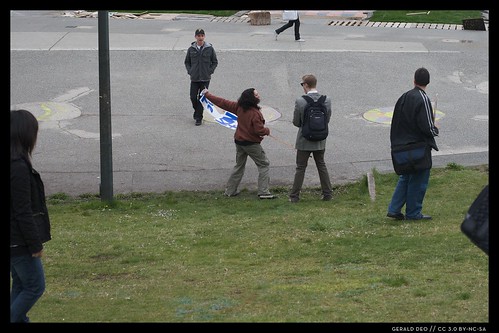
It turns out the protection was necessary: Jasmine was on the scene right quick, hurling insults and accusations and stripping signs from "protesters" and tearing them in half. 
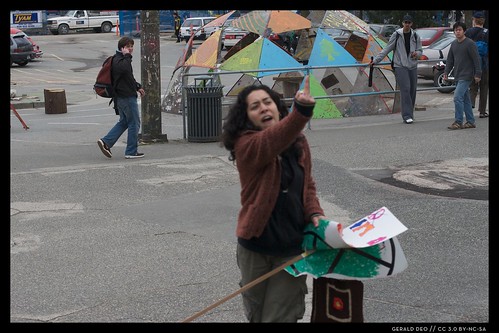
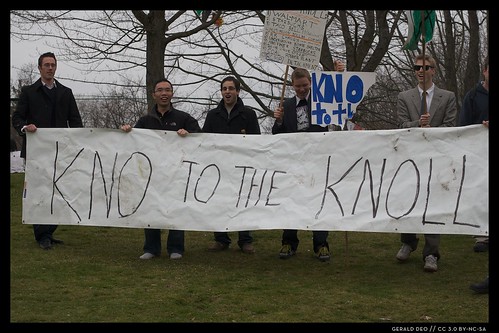
The KNO folks took this in stride, and held up their banner while chanting "Peaceful Protest" as Nate tried to calm the situation down, and Jasmine got in a shouting match.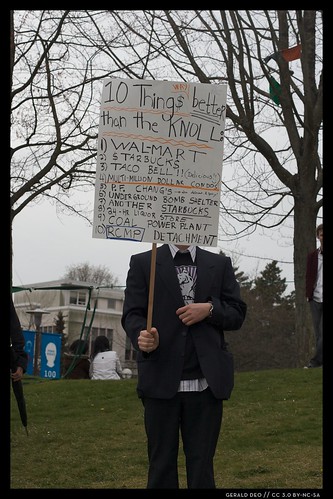
A sampling of their beliefs.
Controversy over, I wandered a bit and sampled the delights of the carnival: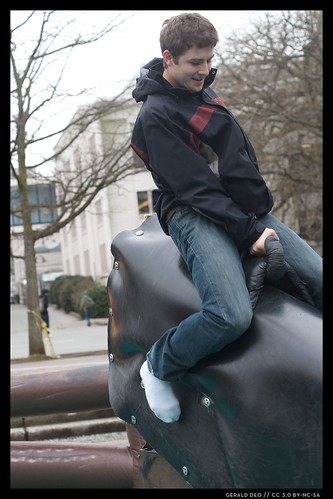
A bull rider.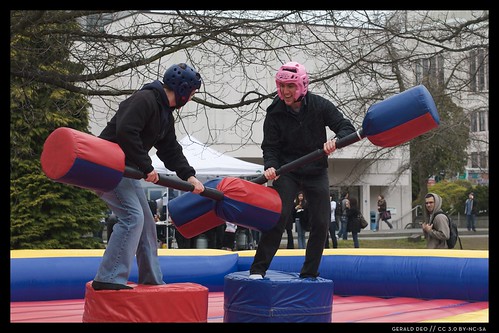
A little faux-gladiator action.
Outgoing Ubyssey Letters and Copy Editor Levi Barnett and incoming News Editor Justin McElroy square off in the Bungee Run.
a little kebab action with the RBF.
I spent the rest of the evening either backstage (as ACF Alumni) or in the media pit, so here are some selected shots.
one of the sponsors of the event.
probably the worst photo ever of Brian Sullivan.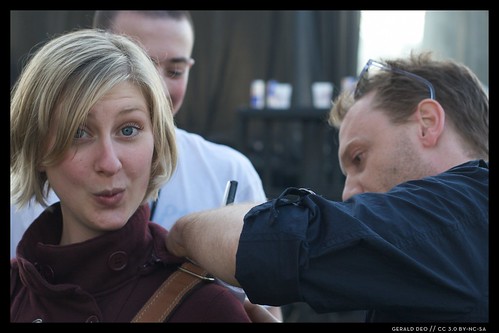
Becca Coad, getting signed by Torq from Stars
Mitch Wright, getting signed by Amy from Stars.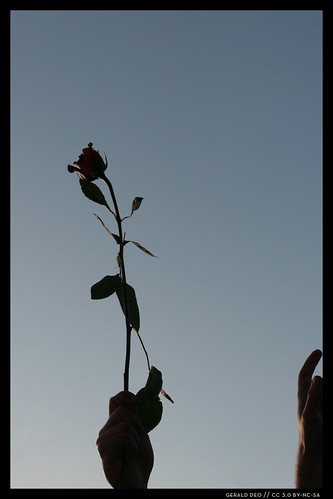
Stars threw flowers into the crowd... I caught someone after they caught one.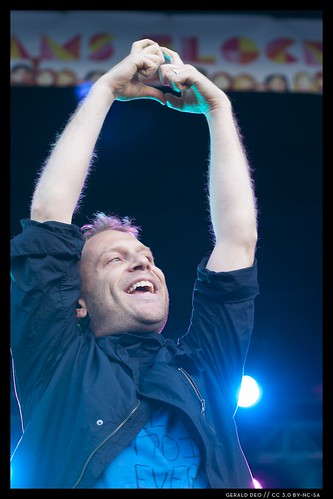
He's making a heart with his fingers.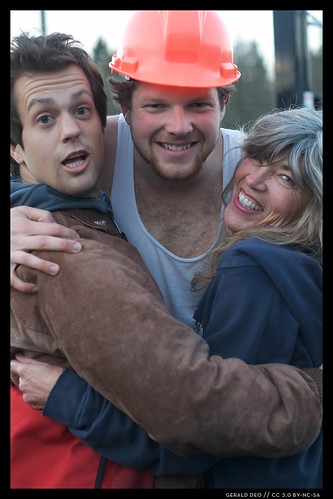
Jeff Friedrich, Mike Duncan, and the always lovely Nancy Toogood.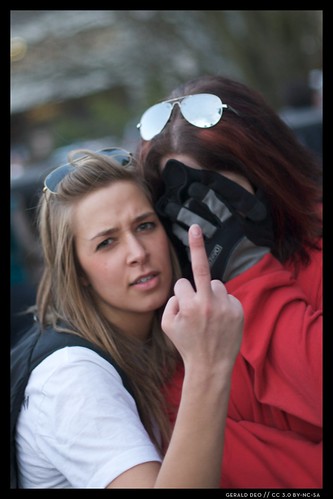
Anna and Emily from AMS Events.
As always, I've got more photos up here: my Flickr page.
How was your day?
Posted by
Gerald
at
6:42 PM
![]()
Friday, April 11, 2008
quickie update.
Looks like Kwantlen won't be leaving the CFS just yet.
Steve Lee, KUSA Director of Finance, had this to say (via MSN): "one major complaint was the high amount of stuff - free food, donuts, candy, isic cards, buttons - that the cfs was giving away.
when we put forward a set of rules to the judge last month it did not include a provision to ban the giving away of free food or other similar items - which we usually have banned from distribution during our regular ksa elections so that a campaign is about ideas not about who can give away more stuff."
More information about the CFS vs Kwantlen case can be found here.
Posted by
Gerald
at
8:51 AM
![]()
Thursday, April 10, 2008
Monday, April 7, 2008
An Open Letter to the AMS
Sometimes in times of crisis it's important to look at the big picture. So that's what I'm going to attempt here. Make no mistake - the AMS has as fundamental a crisis as it can realistically expect to face. Since it has mandatory membership its very existence is not at stake, but its ability to make a positive change for students, either by lobbying or by campus presence, is very much at risk.
The AMS' credibility is shot. The Lougheed and Bonfire Affairs have pretty much turned the AMS into as much of a joke as possible. Students generally used to be fairly ambivalent; it's safe to say that the tide has turned. Students on all sides of the political spectrum have some serious grievance or other against the Society, and students in the middle are completely and entirely alienated by the insane and fractious factionalism that makes the U.S. House of Representatives look downright civil by comparison. Indeed, the only unifying belief is that the AMS isn't worth students' time. Not only has the AMS lost respect of students, it's also lost the respect of those with whom it needs to have a productive relationship - the media, the University, various authorities, and the community at large. And so much time will have been spent on damage control, diverting energies from worthwhile reforms.
The root cause is the unnecessarily bitter factionalism that's driven a wedge within the society. What began as an ideological cleavage has rapidly descended into the poisonous, petty politics of personal vendettas. While tempting, there's no need to blame anything else.
There's an upside - the AMS is still a relatively healthy society, and students have many reasons to appreciate it. It's still in good financial shape, just passed a transformative referendum, and was on its way to becoming the centre of campus discourse once again. Moreover, the AMS has an opportunity this week, with a Council meeting and the Block Party, to take the first steps to make it right.
There are some relatively easy steps to take. My rules:
- A joint statement, signed by all the AMS execs. State what you agree on, and the areas that you can work on together to improve students' lives.
- Don't suppress debate - you're not going to agree on everything. But, when there's a disagreement, and it's intractable, put it aside for a couple weeks. A month. Take a cooling-off period, and spend this Council meeting looking for common ground. If people are disagreeing on something fundamental - move on.
- Let the exec do its job. That's hugely critical at this time. And let the exec speak for the AMS.
- Circle the wagons. You don't have to become mindless cheerleaders, but make it known when you support each other. Again, find common ground.
- Pay attention to words. No ad hominem remarks about who's sleeping with whom, or that people don't respect democracy, or are reckless. If a word gets a negative reaction from someone - drop it. Antagonizing people gets us nowhere.
- No gossip. Scandal and gossip are fun and as "fun" as things get for student politicians, but right now, they're adding fuel to the fire.
- Run a kick-ass Block Party. Channel your energy there, and give students an amazing send-off to the year. Be relevant!
Posted by
Tim Louman-Gardiner
at
8:01 PM
![]()
Categories: AMS, Student Movement, Student Politics
Sunday, April 6, 2008
B.C. PSE budgets are actually being cut
Last week, the Vancouver Sun broke a story about the Campbell government's decision to deviate from the expected funding levels for post-secondary institutions by redistributing some money, boosting health care and trade training in some colleges and cutting university funding. I wrote a post saying how reasonable this was with respect to strategic development of PSE in B.C. Well, it seems that that wasn't the whole story. As Erin Millar reports in her excellent Macleans article it tuns out that this budget change isn't just a re-allocation of money from some types of undergraduate programs (full-time student seats) to higher priority programs, but an actual cross-the-board reduction from the expected levels, as well. That means that UBC, among other institutions, are experiencing a reduction in per-student funding, but also a reduction from the expected level of base funding.
How much exactly isn't clear: according to a statement released by UBC President Stephen Toope, the clawback is 4.5 million for UBC-O and 11.3 million for UBC-V. He points out that UBC's budget is still increasing compared to last year, but by 5% instead of 8%. According to the Confederation of University Faculty Associations (CUFA), the numbers are actually higher than that. They estimate 12.4 million less in base funding (from the cross-the-board 2.6% cut) and an additional $5 million less from the reduction in full-time student seat funding, bringing the total cut to $17.4 million for both of UBC's campuses. System wide, CUFA estimates the cuts are worth 40-60 million.
In any event, this is bad news for UBC, which is already struggling to deal with its own structural recurring deficit through program cuts. Such an announcement right before the start of the new fiscal year, after all the budgeting for the university had already been completed is rather a shock. There's been no word about how exactly UBC will absorb this shortfall, though other colleges have already announced layoffs. Even more worrisome is that the government seems to be attempting to spin this as a redistribution only, when it in fact seems to be an cross-the-board reduction from the expected levels by 2.6% AND a FTE redistribution (though still an increase from last year). What's the point in sending the universities letters with the expected funding levels on which to base their budgeting if they don't abide by them?
A group of students and professors from across the province have formed a group called "Coalition Against Funding Cuts" to draw attention to all this. Check out their facebook group HERE for more info on what's being done.
Perhaps universities and colleges have expanded to to much too quickly in a manner that's just unsustainable. If tuition hikes (which we have experienced in the last five years) and great economic times (which we've also experienced in the last five years) aren't enough to satisfactorily fund the province's post-secondary education system, maybe there's something wrong with the size or character of the system in general. I haven't researched exactly how universities and colleges have expanded in the last 20 years, so I don't know, exactly, but I know that just hiring faculty with regular promotions costs more money than the university actually has - a major contributing factor to UBC's own deficit. A sobering thought.
Posted by
maayan kreitzman
at
1:49 PM
![]()
Categories: Government, News
Updates on the Arrests
Edit/Update: Here are some more details from the CBC website, a video and an eyewitness account from Blake Frederick, elected Senator and student. We will write a more thorough analysis as more details become available.
Update 2: A judge will determine around 1pm today (Saturday April 5) at the DTES Criminal Court whether the five or more arrested students will be criminally charged or if they will be released. More updates to come.
Update 3: Youtube clip (anonymously submitted), and another Youtube clip of the bonfire and VP External Stef Ratjen being detained . Here you can keep yourself updated on the rest of the media's coverage.
Update 4: Another Youtube clip of the students being arrested. There is an individual on a bicycle who seems to have been plugged from the crowd and arrested. What did he do to be arrested?
Posted by
----
at
12:07 AM
![]()
Categories: Development, News
Saturday, April 5, 2008
25 students detained during peaceful protest
(restructured post for new readers) PRESS RELEASE: POLICE BRUTALITY AT KNOLL AID Today a peaceful celebration in defence of public space at UBC was violently quashed by the RCMP. This press release was written on April 5th at 1 a.m. with limited available information. All the events discussed herein have been either captured by camera or can be corroborated by multiple eyewitness accounts. On Friday, April 4th, UBC students loosely associated with Trek Park and SDS held "Knoll Aid 2.0," a musical celebration of public space on campus. Knoll Aid 2.0 was part of a larger campaign against the commercialization of campus, the demolition of the grassy knoll, and the development of a $40 underground bus-loop. Knoll Aid 2.0 was an overwhelmingly peaceful event and featured local musicians, free food, and three simultaneous petition drives. It was attended by primarily UBC students. Though Knoll Aid 2.0 began at noon on Friday, at around 8:00/8:30 RCMP and the Fire department arrived at the area known as "Trek Park" (a liberated space near the grassy knoll) because some students had created a small bonfire. Citing a bylaw violation, the RCMP approached one student, Stefanie Ratjen, in a rather aggressive manner and began speaking with her. After a dialogue, the contents of which are still unknown, Stefanie was grabbed by an RCMP officer and thrown to the ground, pinned, and handcuffed. Her face was literally shoved in a puddle of mud while an RCMP officer sat on top of her. After this uncalled act of police aggression, fellow students came to her aid. One musician was immediately arrested for questioning the RCMP officer's treatment of Stefanie. For approx. two hours students formed a chain to protest RCMP action and several students attempted to peacefully negotiate the release of Stefanie and the musician (whose name at this point is unknown). During this time approx. 30 RCMP cars with officers from across Vancouver and the lower mainland including Richmond came to UBC. Campus security was also present and threatened to discipline students if they did not cooperate with the RCMP. Police officers systematically attempted to break the human chain students had formed by pushing, shoving and kicking. RCMP officers randomly arrested any student present at the scene including Bahram Norouzi who was arrested in the middle of a CTV interview. At around 10:30 p.m. on approx. 25 students were arrested and detained. They were brought to a Main and Hastings detention center where they presently still remain. This press release would like to draw attention to the conduct of the RCMP. A university is intended for students, not the police. Upon entering student space, the police should have had the decency, at the very least, to deal with students in a respectful and dignified manner. Instead, RCMP officers were highly aggressive and belligerent. RCMP officers committed gross abuses of power by, for example, threatening to release dogs on students and pointing taser guns at students that were already pinned down to the floor. The actions of RCMP officers are testament of police misconduct, if not brutality. We demand the release of all students arrested and demand that all charges be dropped. Furthermore, we demand an inquiry of the RCMP's actions in relation to this event and the treatment of students. Lastly, we demand that UBC administration defends student's rights to a peaceful protest. To repeat, this was a peaceful celebration/concert in defence of public space. The RCMP had no right to violently quash a peaceful student protest. Signed, Trek Park for the People Students for a Democratic Society Student Environment Center Social Justice Center
Students peacefully protest the arrest of a fellow student Photocredit: Geoff Dunbrack
On April 4th students lit a bonfire and held a music and dance night in support of the grassy knoll on campus. The Fire Department arrived to put out the large bonfire, and this escalated into a number of confrontations and students being arrested.
The press release below was sent to me before there was anything to be found on the RCMP media website or any other news source, but from the limited information I can't help but wonder if the police used unnecessary force if its intentions were to put out a bonfire. While I don't think the police needs to act differently in a student space from anywhere else (as the press release suggests), the police conduct makes me think of 1968 Germany.
I ask that anonymous comments be at least signed with initials.
Press release from Students for a Democratic Society as well as more photos behind the jump.
Here are some photos taken by students on the scene.
Photocredit: Geoff Dunbrack
Posted by
----
at
1:30 AM
![]()
Categories: Development, News
Tuesday, April 1, 2008
March 2008 AMS Referendum results
Don't forget the below posts. It's a busy week!
Well, unoficial results are in, and all the questions have been approved with a majority 'yes' vote. Here are the numbers:
Overall turnout: 44%
Total votes: 18,446
U-Pass renewal NO: 500 YES: 17,945 ; 97.2% in favour
Bylaw reforms NO: 1284 YES: 4357 ; 77.3% in favour
WUSC (student refugee subsidy) NO: 2162 YES: 8363 ; 79.4% in favour
SUB renewal fee NO: 6228 YES: 7342; 54% in favour
Good overall turnout - the quorum of 10% of daytime students was met in every question easily. SUB renewal fee passed by a very thin margin. I suspect the AMS will have to do a helluva good consultation to create the level of buy-in that's really needed. 54% isn't great - particularly considering that all the students that voted will be paying $40/year max towards the building (not much compared to the cost to future cycles of students). More discussion of SUB renew to come.
UBC school of music takes a stand against CBC Radio 2 butchering
I admit, this is a topic that I would have written about regardless of the UBC angle. I'm that angry over it. And you should be too. Our wonderful public broadcaster needs to listen to its listeners, for once.
CBC management, with the wisdom of it's lobotomized-gerbil brain trust, decided last Thursday to disband the CBC Radio Orchestra, the last remaining radio orchestra in North America. This move follows closely on the heels of a major overhaul of the Corp's Radio 2 programming away from its core classical programs towards more "diverse" music. Basically, all the best classical programs from the morning and evening primetime slots have been axed, to be replaced with poppy "easy-listening" largely Canadian content. Classical programming will be relegated to daytime hours when most people are at school and work.
This morning around 10:00, 150 people gathered outside the CBC to protest these changes. Among them were UBC students and faculty from the school of music, who had their classes cancelled this morning in order to attend. Read about the protest HERE, and see a couple photos on Tod Maffin's CBC blog HERE.
The "Save Classical Music at the CBC" facebook group summarizes the changes announced for Radio 2:Gone are Music & Company - Tom Allen's morning show, Here's to You - Catherine Belyea's (Formerly Shelley Solmes') all-request show, Studio Sparks - due to the venerable Eric Friesen's "retirement", and Disc Drive - Jurgen Gothe's popular drive-home show after almost 30 years. These changes come on the heels of last years round of cuts to vital programs such as Danielle Charbonneau's much-loved Music for Awhile; Larry Lake's new composer showcase Two New Hours; Symphony Hall - Canada's live orchestra recording showcase; The Singer and the Song - Catherine Belyea's excellent Classical vocal program; Northern Lights - the overnight Classical program beloved by Night Owls everywhere; The reformatting of In Performance- a primarily classical live performance show into the much-reviled Canada Live - a uniformly non-classical and completely unfocused hodge-podge of World music, soft pop, and sort-of Jazz; and the controversial replacement of veteran Howard Dyck from Saturday Afternoon at the Opera after many years of great service.12. The CBC axing the Radio Orchestra one day citing lack of resources, and the next day buying hugely expensive full-page ad in the Globe and Mail to convince us how wonderful everything is going to be in their Brave New World.
This isn't including changes that have already occured, including the cancellation of Rick Philips's wonderful Sound Advice, Two New Hours, the axing of the classical division of the CBC record label, and plenty more. You can get the full list of the denuded classical programs HERE.
All this is to snare elusive and desirable "demographics" and convert them to CBC listeners. Apparently, classical music is only enjoyed and appreciated by retired grandmas, and the rest of us "key demographics" are just way too cool for it. Instead, we would like to listen to Leslie Fiest and Joni Mitchel ad infinitum. Eugh. Jeffery Simpson and Russel Smith had a good articles about all this in last week's Globe. The McGill Daily also reported on it. I agree with Mr. Simpson that CBC is only relevant and worth the investment as long as it caters to Canadians' intelligence and high culture. Diluting Radio 2's classical offerings in a race to the bottom with commercial radio is a lack of foresight of the worst kind. I think it's undeniable that CBC needs another national FM frequency for a wider variety of popular and world music - and that's originally what CBC Radio 3 was envisioned to be. Unfortunately, that idea was also demolished by another foresight-deficient president (Rabinovitch) only leaving a sort of internet residue - and we're paying for it now. It's sad to see Radio 2 being re-directed to straddle both missions - because it won't do a good quality job at either.
If you want classical music to stay, make your voice heard. I've written a letter to my MP, and various members of the CBC brass. Find contact details on the facebook group.
Posted by
maayan kreitzman
at
5:44 PM
![]()
Categories: Campus Life, what the fuck.







